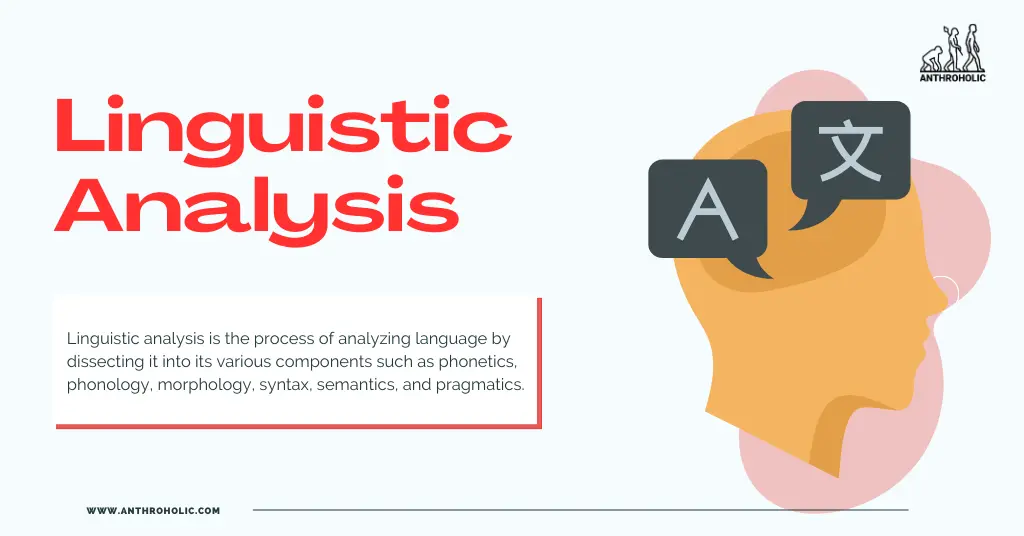AI Answer Evaluation Platform Live Now. Try Free Answer Evaluation Now
Linguistic Analysis
Linguistic analysis is the process of analyzing language by dissecting it into its various components such as phonetics, phonology, morphology, syntax, semantics, and pragmatics [1]. Linguistic anthropology, on the other hand, is the interdisciplinary study of how language influences social life. It examines language’s role in social identity, relationships, and cultural understanding, making linguistic analysis a vital tool in this field [2].

Linguistic Analysis in Anthropology
Historical Perspective
Linguistic anthropology originated from the intellectual tradition of understanding language in its social context. The works of Franz Boas, Edward Sapir, and Leonard Bloomfield laid the foundation for this field [3]. The 20th century witnessed a surge in the application of linguistic analysis in anthropology, particularly with the advent of structuralism, which emphasized understanding the underlying structure of language and culture [4].
Emergence of Linguistic Anthropology
The field gained momentum during the mid-20th century, with the integration of linguistic methods in anthropological research. The focus shifted from merely documenting languages to analyzing how language reflects and shapes human experience [5].
Key Theorists and Contributions
Some prominent figures such as Roman Jakobson, Ferdinand de Saussure, and Noam Chomsky have contributed significantly to understanding language structure and its functions [6]. These theorists have paved the way for a comprehensive approach to linguistic analysis within anthropology.
Methodological Approaches
Structuralism and Functionalism
Structuralism emphasizes the underlying patterns of language, whereas functionalism focuses on how language serves various communicative functions in social contexts [7]. These approaches have guided anthropologists in understanding cultural phenomena through language.
Ethnography of Communication
Pioneered by Dell Hymes, the ethnography of communication explores the ways language is used within specific cultural contexts. It has significantly influenced anthropological research by highlighting the intricate relationship between language, culture, and society.
Sociolinguistics
Sociolinguistics examines the relationship between language and social variables like class, gender, and ethnicity. It provides insights into how language variations and choices can reflect social hierarchies and identities.
Types of Linguistic Analysis
Linguistic analysis is multifaceted, comprising several interconnected aspects. Here’s an in-depth look at these:
Phonetic and Phonological Analysis
Definition and Importance
Phonetics deals with the physical sounds of language, whereas phonology studies the way sounds function within particular languages or language families. These analyses enable us to understand the sound patterns and rules within languages, essential for both language preservation and linguistic anthropology.
Tools and Techniques
Various tools, such as spectrograms and articulatory phonetics, have been employed to study sounds scientifically. Fieldwork often includes recording native speakers, which can later be analyzed using specialized software.
Morphological Analysis
Analysis of Word Structure
Morphology involves studying the structure of words, particularly how they are formed by combining basic units called morphemes. This helps in understanding the rules governing word formation in different languages, thereby illuminating cultural patterns.
Syntax Analysis
Sentence Structure
Syntax analyzes the structure of sentences, considering how words and phrases are combined according to specific grammatical rules. Such analysis aids in understanding how thoughts and ideas are conveyed through language, reflecting cognitive processes.
Dependency Grammar
Dependency grammar focuses on the syntactic relationships between words in a sentence. It has applications in computational linguistics and offers insights into how languages differ in sentence structure.
Semantics and Pragmatics Analysis
Meaning in Language
Semantics deals with meaning in language, including word meaning and sentence interpretation. Pragmatics further explores how context affects meaning. Both areas are vital for understanding not only the structure of language but also how people use language to convey meaning within various cultural contexts.
Contextual Use
The pragmatic aspect of analysis stresses how language use varies according to context, audience, and purpose. It reveals how language reflects social norms and cultural practices.
Applications in Anthropology
Language and Culture
- Cultural Linguistics: Cultural linguistics explores how language embodies cultural perceptions and cognitive models. The analysis of metaphors, idioms, and discourse patterns uncovers cultural worldviews and belief systems.
- Language as Cultural Expression: Language serves as a means to express and construct cultural identity. The analysis of language choices, styles, and variations often reflects underlying cultural values, social dynamics, and historical contexts.
Language and Identity
- Ethnicity and Nationality: Language plays a crucial role in the construction of ethnic and national identities. By analyzing language practices and preferences, anthropologists can gain insights into identity negotiations and alignments within diverse communities.
- Gender and Sexuality: Linguistic analysis has also revealed how language constructs and reflects gender roles and sexual identities. The use of specific terms, pronouns, and speech styles often embodies societal gender norms and expectations.
Case Studies
Case Study 1: Language Revitalization
Background and Importance
Language revitalization efforts seek to preserve or revive endangered or minority languages. Linguistic analysis is crucial in these endeavors, enabling accurate documentation, teaching, and promotion of the language.
Methodology and Findings
Through in-depth analysis of grammar, phonetics, and syntax, linguists can develop educational materials, promote community engagement, and support language preservation efforts. Case studies like the revitalization of the Welsh language showcase the success of such efforts.
Case Study 2: Linguistic Gender Roles in Society
Cultural Context
Language often reflects societal gender roles and expectations. Linguistic analysis can reveal how language enforces gender stereotypes and influences perceptions of gender.
Linguistic Analysis
By examining gendered terms, speech patterns, and discourse, researchers can uncover the subtle ways language reinforces gender norms. Studies on gendered language in Japanese society, for example, have provided rich insights into cultural attitudes towards gender roles.
Conclusion
Linguistic analysis, with its multifaceted approach encompassing phonetics, phonology, morphology, syntax, semantics, and pragmatics, offers invaluable insights into the relationship between language and culture. It plays a pivotal role in understanding social identity, relationships, power dynamics, and cultural practices.
The applications of linguistic analysis in anthropology are far-reaching, with significant contributions to fields such as cultural studies, political science, gender studies, and more. Continued exploration and methodological innovation will undoubtedly yield further insights and applications, contributing to a richer understanding of human social life.
References
[1] Crystal, D. (2008). A Dictionary of Linguistics and Phonetics. Wiley-Blackwell.
[2] Duranti, A. (1997). Linguistic Anthropology. Cambridge University Press.
[3] Boas, F. (1911). Introduction to Handbook of American Indian Languages.
[4] Saussure, F. de. (2011). Course in General Linguistics. Columbia University Press.
[5] Hymes, D. (1962). Language in Culture and Society: A Reader in Linguistics and Anthropology. Harper & Row. https://archive.org/stream/in.ernet.dli.2015.149461/2015.149461.Language-In-Culture-And-Society_djvu.txt
[6] Chomsky, N. (1965). Aspects of the Theory of Syntax. MIT Press.
[7] Givón, T. (2001). Syntax: An Introduction. John Benjamins Publishing Company.




